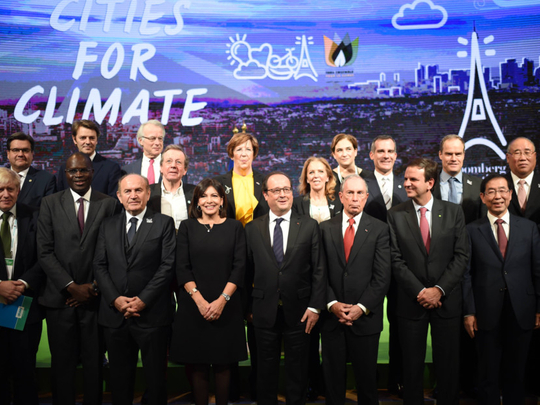
A historical and ambitious agreement to commit all countries to cut emissions, combat climate change and unleash actions and investment towards a low-carbon economy and sustainable future was agreed upon by 195 nations at COP21 in Paris last Saturday.
In fact, the Paris climate pact will help keep sustainable development on the right track and realise Sustainable Development Goal (SDG) No 13: ‘Take urgent action to combat climate change and its impacts.’ The SDGs were recently adopted by all members of the United Nations to fight poverty, inequality, as well as spread peace and prosperity.
This Paris deal is the first to commit all countries to cut carbon emissions and it is partly legally binding and partly voluntary. Some aspects such as submitting emissions reduction targets and regular reviews of the goals are legally binding. However, some others, such as targets set by nations, will not be legally binding. The key countries and blocs — including the G77 group of developing countries, the Arab group, the oil countries, China, India and Russia — welcomed the agreement as ambitious and balanced. Also, for the first time, a climate agreement has the United States and Canada on board as well.
Two key aspects of the agreement are:
n Keeping global temperature increase “well below” 2 degrees Celsius and to pursue efforts to limit it to 1.5 degrees Celsius above pre-industrial levels.
n On climate finance, $100 billion (Dh367.8 billion) a year for developing countries by 2020, with a commitment to further finance in the future. This means the developing nations won’t have to contribute any cash; the developed ones will have to give more money in the new deal and with greater predictability.
So, what does this agreement mean for the Gulf Cooperation Council (GCC)? This agreement sends a powerful signal that the world is fully committed to a low-carbon future and that the transition to a low-carbon economy is now unstoppable. In other words, it sends strong signals to investors and energy markets, triggering a fundamental shift away from investment in coal, oil and gas as primary energy sources towards low-carbon energy, such as from wind and solar power.
The structure of the new climate deal ensures that there will be regular five-year reviews, which will encourage global cooperation to find technological solutions to cut emissions and protect poor countries from climate change.
This in turn means that the Paris climate agreement is of particular importance for the GCC countries because of the issue of fossil fuels, which form the backbone of the Gulf economies. Currently, in all nations, the industrial, energy and agricultural sectors depend almost entirely on fossil fuels and generate a large proportion of greenhouse gases. Therefore, any action taken in this regard may affect the demand for fossil fuels, the main source of carbon dioxide emissions, especially in the countries that adopt laws and policies to reduce emissions due to the implementation of Paris climate pact. This will eventually severely impact the economies of the oil-rich Gulf countries. That is why the Paris agreement is a major challenge for countries that rely on fossil fuels as a major source of revenue.
But on the other hand, it also represents a key opportunity for the GCC to speed up the process of economic diversification as well as invest more in clean and renewable energy sources — especially solar power.
As petroleum companies extract more and more from the earth’s crust to go deeper and deeper to reach new reservoirs, the exercise will become extremely un-economical, especially as the per-unit costs of other renewable forms of energy keep coming down. However, I still believe that oil and gas, at least in the medium term (for 15-20 years), will be one of the main sources of energy internationally.
Currently, according to the International Energy Agency, oil and gas represent around 53 per cent of the total primary energy supply of the world. This means that oil-rich countries have a good window of time to use the revenue from oil and gas towards developing renewable technology.
So, in short, yes, the Paris agreement is a real challenge for GCC countries, but, at the same time, it is a genuine opportunity for the Gulf states to cooperate with all partners — local, regional and global — in the field of renewable technology transfer and deployment as well as to tap into the many opportunities for climate finance offered by the pact.
Dr Mohamed Abdel Raouf is an independent environment researcher.












